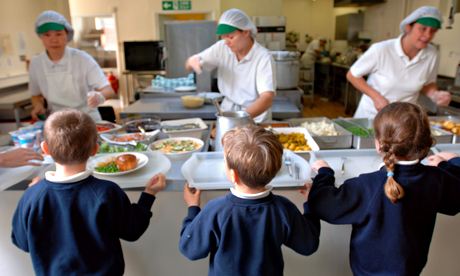
One of Britain's top doctors has warned that children's health is being damaged because academies and free schools are allowed to opt out of serving healthy lunches to their pupils.
Two million children at such schools are now at risk of exposure to unhealthy foods as a result of the coalition government's divisive and "irresponsible" policy, which is undermining the fight against childhood obesity, Professor Terence Stephenson told the Observer.
Stephenson, chair of the Academy of Medical Royal Colleges (AoMRC) – the professional body for the UK's 250,000 working doctors – launched a sharply worded attack on government inaction over Britons' dangerously expanding waistlines. He also accused academies and free schools – which need not comply with the same nutrient-based standards for pupils' lunches as grant-maintained schools – of setting young people a bad example.
"It's damaging children's health," he said. "Allowing children in academies and free schools to be exposed to unhealthy choices, unhealthy foods and unhealthy diets when there's still huge concern in this country about obesity in children is definitely a backward step. Too many schools have been allowed to withdraw from this excellent, evidence-based system," said Stephenson, a leading paediatrician.
"It just doesn't make sense to have a 'them and us' policy on something as important as school food. If it's the right policy for children in maintained schools, it's the right policy for all children. It's irresponsible to have a two-tier policy on this," he said.
Research shows that children who eat the healthy school lunches consume less salt and fat.
In a controversial move in 2010, the education secretary Michael Gove exempted academies set up under the coalition from the standards, widely admired for improving pupils' behaviour and concentration, which have been compulsory in traditional schools in England since 2006. They were introduced after Jamie Oliver used his 2005 Channel 4 series Jamie's School Dinners to reveal how much unhealthy fare was served in school canteens, prompting the then Labour government to act. Oliver has been a vocal critic of Gove over the opt-out for academies and free schools. He called on ministers last week to stop the "madness" of fast food outlets opening near schools and for a "visionary" to lead a renewed drive against obesity.
Academies have mushroomed under the coalition to the extent that there are now 3,689 of them, including 1,789 secondaries, as well as 174 free schools. Together they have about 2m pupils, about one in four of England's eight million schoolchildren.
Stephenson said the coalition's failure to end their exemption was the most conspicuous example of ministers not implementing the 10 recommendations the AoMRC made in its major report on obesity in February 2013. He was "disappointed" and "frustrated" at the complete lack of progress on five of its suggestions, including a crackdown on junk-food advertising and introduction of a 20% tax on sugary drinks to reduce consumption, an idea the government's chief medical officer said recently should be considered.
However, he also hailed four "welcome advances" in the past year. They include: the impending introduction of free school meals for all infant pupils in England; the addition of cooking skills to the school curriculum; and last year's voluntary agreement on a clearer food-labelling scheme, although a number of major food producers have shunned it.
"The medical profession acknowledges the movement in these areas, which we applaud, and that politicians are more aware of the obesity crisis. But we want the government to go further, not take its foot off the pedal and take action commensurate with the scale of the problem. We need to see more action," Stephenson said.
Tough action was urgently needed because obesity has become one of the two biggest risk factors for avoidable death in the UK, alongside smoking. Doctors see the failure of administrations across the UK – Westminster, Edinburgh, Cardiff and Belfast – to commit to investing at least £100m a year until 2016 to expand the availability of weight management services as "a cause for concern", according to a scorecard the academy has produced assessing progress since its report.
Linda Cregan, chief executive of the Children's Food Trust, said it believed every pupil should receive healthy, nutritious food while at school. It is involved in revising the school food standards following the publication last year of the School Food Plan, commissioned by Gove and prepared by the co-founders of the Leon food chain. In 2012 CFT research showed that 89 out of 100 academies were selling junk food such as crisps, chocolate and cereal bars that were banned in maintained schools alongside the introduction of the nutritional standards.
Dr Hilary Cass, president of the Royal College of Paediatrics and Child Health, backed Stephenson. "People will argue about the merits or otherwise of giving schools freedom over the curriculum and how children are taught, but when it comes to school food, there can be no debate. It's time to stop playing politics with the health of our children," she said.
But the Department for Education dismissed Stephenson's concerns. "There is no evidence whatsoever that academies and free schools serve less healthy food than council-run schools. It is utterly disingenuous and untrue to claim the academies programme is harming children's health," a spokesman said.
"A survey by the Children's Food Trust found 99% of academies have voluntarily agreed to follow the food standards, even though they are not required to do so. By contrast many council-run schools – unlike the best academies – are failing to provide healthy options, instead continuing to serve fried food, fizzy drinks and pizza.
"Instead of pretending there is a problem with a particular type of school, we should concentrate on improving food in all schools," the DfE spokesman said.

